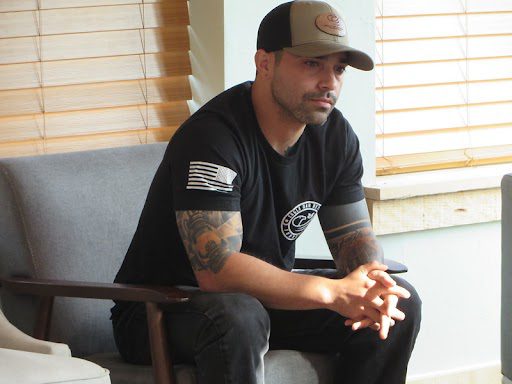Empowering the UNC Charlotte military community through post-traumatic growth

For many veterans, transitioning from active duty to civilian life is both a challenge and an opportunity. For more than 12 years, Juan Pizaro served in combat arms and special operations units in the U.S. military. Now a Master of Social Work student at UNC Charlotte, Pizarro is using everything he has learned about mental health to help his fellow servicemen.
Pizarro joined the U.S. Army as an infantryman at age 18. He was stationed in Germany, Kentucky and North Carolina and in over a decade of service held ranks from private to sergeant first class, and his current position at the UNC Charlotte Military Science Program, Cadet.
After Pizarro’s last deployment, his wife moved to Charlotte and in order to spend more time with her, he applied for the Army’s Green to Gold Program at UNC Charlotte, enabling him to remain an active duty soldier while pursuing a degree. Before leaving he asked his commander what he would recommend doing before commissioning. His commander recommended he check out the Warrior Progressive and Alternative Training for Helping Heroes program.
Warrior PATHH is for veterans with post-traumatic stress. Pizarro said the eye-opening experience was like being with your favorite baseball team, sitting amongst the military heroes that inspired him to enlist in the first place.
“Finding out that your heroes have thoughts of suicide, they blame themselves for other people’s deaths, they can’t sleep, feel isolated, it hit pretty hard for me,” Pizarro said.
When Pizaro told the veterans in the program that he was an active-duty senior non-commissioned officer, they responded by saying they wished their leaders would have done this training while they were still in the Army.
As a UNC Charlotte student, Pizarro is translating his experiences into meaningful advocacy for mental health and resilience. His passion is rooted in the transformative power of post-traumatic growth, a term coined by UNC Charlotte researchers Richard Tedeschi and Lawrence Calhoun, which was central in the Warrior PATHH program.
“For me it’s about finding opportunity and growth through our traumatic experiences,” Pizarro said. “There’s a saying that what doesn’t kill you, makes you stronger, and there is scientific evidence that proves that true for some traumatic experiences.”
Pizarro showcased the impact of post-traumatic growth in the University’s 3-Minute Thesis competition. He outlined how to integrate post-traumatic growth into military education starting at basic training. Pizarro noted many soldiers enter the military with high adverse childhood experiences scores, which can be compounded through combat or simulated combat in the military.
“The highest cause for death in the military is still suicide,” Pizarro said. “At this point, it is worth acknowledging that we have soldiers who come in with trauma, we compound that trauma, and when it’s too much for soldiers, we kick them out.”
Pizarro is not only furthering his education but is dedicated to empowering others through service, leadership and active engagement on campus. He serves as vice president of the Student Veterans of America chapter and Advocates for Change, a campus organization promoting mental health awareness. Pizarro also interned with the University’s Military and Veteran Services Office, allowing him to contribute to the development of the green zone for students course, a support network designed to help veterans navigate University life.
Off campus, Pizarro is a a social work intern with the Integrated Behavioral Health team at Davidson’s Primary Care Clinic. This allows him to deepen his understanding of mental health support outside of the military community. Pizarro said his exposure to post-traumatic growth fueled this commitment to community.
“It has helped me pursue social work and be in service to my community and country beyond the military,” Pizarro said. “I don’t think I would have recognized that as part of who I am without post-traumatic growth.”
Pizarro uses his physical strength to further worthy causes. He has completed several marathons and ultramarathons, including the Marine Corps Ultramarathon and the Bataan Memorial Death March. During his first year at UNC Charlotte, he participated in the Run the Ball Challenge, a week-long event to raise awareness and funds for students facing mental health challenges.
As a UNC Charlotte student and Student Veteran of America, Pizarro exemplifies resilience, service and advocacy. His personal journey highlights the power of post-traumatic growth but he recognizes there is still work to be done.
“Since leaving the Warrior PATHH retreat, I felt it was my calling to help others and spread awareness about post-traumatic growth,” Pizarro said. “I think in the military, even today, mental health is still stigmatized and a lot of people don’t ask for help. I feel called to share what was shared with me.”
